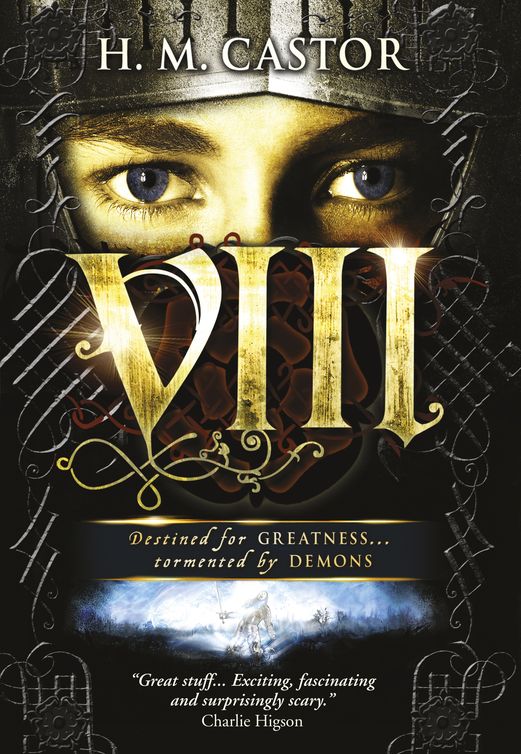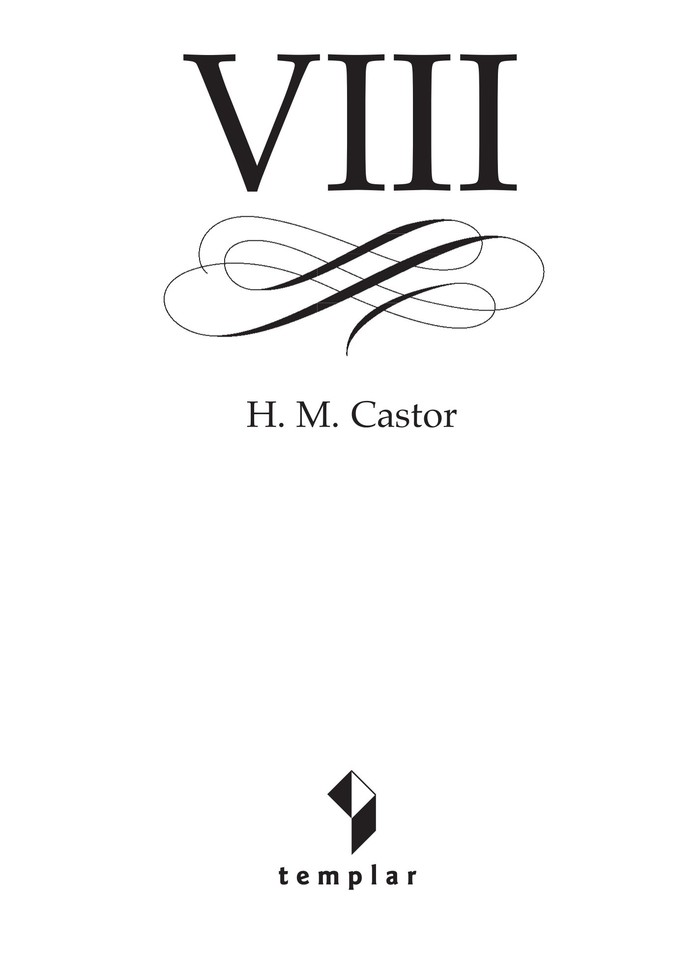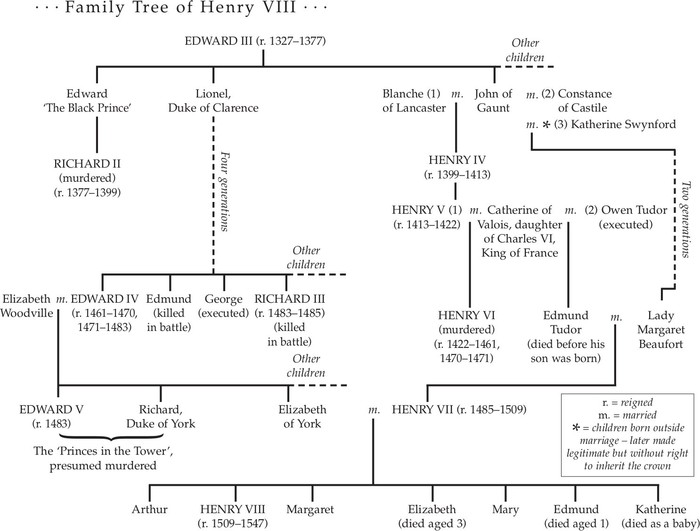VIII
Authors: H. M. Castor


VIII:
“Great stuff. I loved reading books like this when I was younger. A modern take on historical fiction. Exciting, fascinating and surprisingly scary.”
Charlie Higson, author of the
Young Bond
series,
The Enemy
and
The Dead
“H. M. Castor brings the dark and dangerous world of the Tudors to bloody life. In a story which grips from beginning to end, Castor casts the familiar figure of Henry VIII in a fascinating new light. In H. M. Castor, teenage fiction has found its Philippa Gregory or C. J. Sansom.”
Celia Rees, author of
Witch Child
and
The Fool’s Girl
“I wish this book had been around when I was learning about the Tudors! Tightly written and faithful to history, H. M. Castor brings Henry VIII to life by giving us a fascinating glimpse into his innermost thoughts and fears. You’ll be hooked from the very first line by one of the most gripping opening scenes I have ever read.”
Katherine Roberts, author of
Song Quest
, winner of the Branford Boase Award, and
I Am the Great Horse
“H. M. Castor really brings Henry VIII to life… The Tudor court simply hums with conspiracy and rumour alongside the music, poetry and jousting.”
Mary Hoffman, author of
David
and the
Stravaganza
series
“In VIII the familiar story of a much-married king is seen from a new angle. Told from the unique perspective of Henry himself, it reveals the emotional turmoil that influenced his responses. A great read.”
Barbara Mitchelhill, author of
Run Rabbit Run
“… a cracking yarn well told.”
Newbooks Magazine
“A child of extraordinary sensitivity grows up among the restless ghosts of his family’s violent past. With the death of his brother, young Henry Tudor is elevated from isolated ‘spare’ to heir and then king – but his soul is already contaminated by years of abuse and contempt. He can never forget his alternate destiny. Castor creates a chilling depiction of a man of weasel-supple conscience… So well has Castor constructed her psychological portrait that she is able to deliver a truly moving and surprising end to a story we all thought we knew.”
Michelle Lovric, author of The
Book of Human Skin
and
The Undrowned Child

For Richard

The mind is its own place, and in itself Can make a Heav’n of Hell, a Hell of Heav’n.
John Milton,
Paradise Lost
I’m still half asleep when I feel strong hands
grabbing me.
I try to kick but it seems like I’m twisted up in the bedclothes, and the next minute I’ve been swung up into the air and whoever’s carrying me is walking fast and I’m going
bump bump bump
against his chest.
He smells of beer and horses and sweat. And my cheek is rammed against cold metal – a breastplate – so I know he’s a soldier.
He must be one of the rebels. Only I didn’t think the rebels
were
soldiers. I thought they were a mob of stinking peasants from Cornwall, with butcher’s knives and farm tools for weapons.
“Let go of me! Let—”
The man changes his grip; a glove clamps across my mouth. It reeks. “Woah! Don’t struggle, sir. You’re quite safe.”
The words are a trick, of course; I know I am about to die.
The rebels have come for me because I am the king’s son and they want to kill me and my brother and my father. So that someone else can be king.
“Hnnff dnnf yff!”
“Your mother’s orders, sir.”
“Lhhfffh!”
“No, I’m not a liar, sir, and you need to stop kicking. Little shit! Pardon my French, sir, but your teeth aren’t half sharp.”
In the struggle, the blanket I’m wrapped in has been pushed back from my head. The soldier’s holding me across his body, facing outwards now, one of his arms clamped round my hips, the other under my shoulders, with the hand curled up over my mouth, pressing harder than before. My feet are free to kick, but they’re making contact with nothing but tapestries or – painfully – walls and doors and pillars.
At least, in breaks from the struggling, I can see where we’re going. I’m at The Coldharbour – my grandmother’s London house – and the soldier is carrying me down the front staircase, the grand one. It’s dark in the house, but the big window we pass glows softly blue – it must be nearly dawn. When we get to the bottom of the stairs, I see orange torchlight spilling out of the door to the great hall, winking off and on as dark figures move hurriedly through, blocking and unblocking the light. Are they servants or more soldiers? And where’s my grandmother – and my mother? Have they been captured too?
“Nearly there,” says the soldier as he turns down the passageway towards the back of the house. “We’ll be outside in a moment, sir; it’s really important that you’re quiet.”
So I breathe in through my nose, filling my lungs as deeply as the panic will let me, and then – as the soldier steps out through a door into the cold air of the courtyard – I yell as loud as I can into the muffling hand.
“Hllfff! Hllfff! Suuwu hllfff!”
Even I know that the sound is pathetically thin, lost in the wide damp space. And – oh, mercy – out here, soldiers are everywhere.
They won’t take me – they won’t; I twist and thrash for all I’m worth.
“Hey, don’t kick the horse, sir. It’s not fair on the poor beast.”
For a flash I think I’m going to be slung on my stomach across a saddle, the way Compton says prisoners or dead bodies get carried, but the soldier swings my legs up and I land on my bottom – hard, but the right way up.
I hear the soldier say, “Sorry, ma’am. He was asleep when I picked him up. Got himself a bit agitated.” He puffs out a breath. “Strong for a little ’un, isn’t he?”
And an arm grips me around my middle, pulling me back against a body, warm and solid, and a voice in my ear says, “Calm yourself, Hal. It’s me. We’re in a hurry, that’s all.”
My mother.
I want to snuggle into her and cry with relief. I don’t understand what’s happening, my heart’s still banging, my lungs and stomach still heaving, but if I can cling to her, I can cope.
As my mother tugs quickly at my blanket, draping it over my head like a hood and wrapping it firmly round my body, I sit, dazed for a moment, staring at the horses that fill the courtyard. They stamp and snort and toss their heads, harnesses jingling. Each one of them has a soldier in the saddle.
Then I say, in a thin, croaky voice that doesn’t sound like my own, “What’s happening, Mama? Are we running away?”
“No, sweetheart. Just moving to a safer place. Hold on. Here.” She pats the front of the saddle. I grip it and look back,
trying to squint up at her. But my head turns and the blanket stays where it is, so I can see only with one eye, and nothing more than the edge of her face.
She’s hooded too, in a black cloak. I catch sight of the tip of her nose, and part of her cheek. In this weird light – not dawn yet, but not proper night either – her skin looks blue.
As I turn back she reaches around me to adjust the reins and says, “Let’s go, Captain. Steady pace.”
Hooves clatter on the cobbles as the mounted soldiers form a guard around us. Then we set off, filing out through the courtyard gate and turning right, up the lane, away from the river. Though it’s summer, dank mist creeps into the streets from the water behind us; the air tastes wet.
The lane is narrow and dark, squeezed between black walls. The soldiers riding at the front are carrying flaming torches; when we turn right again into a wider street, they fan out to surround us.
There’s something exciting about being out at this time, but I know that no one moves in the night for a
nice
reason. And it’s the second time we’ve had to move in just a few days.
First we came from Eltham, outside London, to my grandmother’s house here, because it’s inside the protection of the City walls. Now we’re moving again. Last time we went in daylight. Now it’s barely dawn. And there hasn’t even been time to get me dressed.
My feet are bare and cold: I reach the left one backwards, tucking it under my mother’s skirts; the right curves towards the warm flesh of the horse, trying to hug it.
Over my head, I hear my mother say sharply, “No faster than this. We’ll attract too much attention. I don’t want to spread panic.”
A man’s voice – one of the guards – replies, but I don’t
catch the words.
She says, “I was told the rebels’ plan was to march at dawn. They won’t come in sight of the City for a couple of hours, surely?”
The man twitches his hands on the reins and his horse moves closer to ours. “It only takes one, ma’am, to’ve ridden ahead. Any doorway, any alley entrance could hide a man with—”
“I understand.”
She’s cut him off deliberately. I see him glance at me, then he drops his horse back again.
He must be the captain of the guard; a moment later I hear the same voice bark an order, and every horse quickens its pace.
Through chattering teeth I manage to say, “W-will we be killed, Mama?”
“No, of course not.” She sounds faintly impatient. “Where we’re going, we’ll be very safe.”
But, as the man said, it only takes one.
Pushing the blanket back from my face, I keep a lookout – through gaps between the soldiers on either side of us – for doorways and alley entrances. Anywhere where the mist collects and thickens – anywhere a man could hide. As we pass a monstrous lump of a building the mist thickens in what looks to me like a human shape, crouching at the corner of the wall. My heart’s in my throat. Do I yell to my mother? Scream to the guard? But then the shape rolls and thins and vanishes into the black air. Just mist – no assassin. I can breathe again.
A gap in the buildings yawns suddenly on our right: the entrance to the docks. The river looks oily-black and vast – and then it disappears as buildings again block the view. Rats scatter from a rubbish heap as we pass it. Shops and
townhouses, now, are showing chinks of light between the shutters of their overhanging upper storeys; servants are lighting fires in their masters’ bedrooms, as Compton does for me. But shabby people are already in the streets. I catch glimpses of them – filthy, like the rats, slipping in slimy gutters to stand flat against the house-walls as we pass. They frighten me, with their blank stares and pinched faces.
A bell begins to clang. It doesn’t stop. Dogs, chained in unseen yards, bark and yelp. Now there’s another bell, somewhere further off. And a man’s voice, thin in the cold air: “Every man to arms!”
Running feet, somewhere behind us. Another voice, closer: “To arms, to arms! Man the walls!”
My mother mutters something I don’t catch. She uses her crop and our horse lurches forward. The guards around us match her pace.
I don’t see him at first – the man who runs in from our left, straight in amongst the riders as if he’s crossing clear ground. But when I turn my head, a face looms; he’s close enough for me to see his bloodshot eyes and his grabbing hand with its grimy, broken nails. He reaches for me, saying something urgent, bellowing.
My mother’s horse tosses its head in alarm and tries to veer away; I cling to the saddle, hunched low, desperate not to slide. At the same moment the nearest soldier lashes out with the butt of his spear.
The man’s down. Down and half-trampled and we’re past him, already half a dozen buildings on.
“Who was that?” I squeak.
“Drunken beggar, sir,” says the captain. “That’s all.”
But I feel so frightened I want to be sick.
The guards ride in closer formation around us after that. Reaching the top of this long street at last, we turn left past
some old stone ruins. The sky is streaked with orangey pink now; against it, on our right, I see grey walls, layers of them, rising one behind another and, beyond, the turrets of a vast white-washed fortress. And I know where we are. This is London’s ancient stronghold: the Tower.
Ahead of us, the street runs uphill and widens into a huge grassy space. We turn to the right, crossing the lower reaches of the slope, and then my mother says, “Here. Thank God.”
We come to a gateway made of brick, its edges all sharp and new. We stop. The captain of the guard speaks to the gatekeepers. Then the horses move again, and we pass through, across a small space, to the next gate. It’s older, this one: an arch made of huge lumps of worn stone, sealed by an ancient wooden door.
“See how thick the walls are, Hal?” my mother says, as the door is dragged open for us. Her voice sounds lighter, almost cheerful.
I look.
“Count the drawbridges. Count the gates. No one can harm us here.”
I count them. At gate number three, a drawbridge stands lowered, but so do two portcullises. The warders raise only one portcullis at a time, and we have to wait in the space between, while with loud grating noises the cranks are turned – to shut the portcullis behind us and then open the one ahead.
Gate number four. It looks like a big black mouth as we approach – and I think of being swallowed by a monster. Again there’s a drawbridge, again a lowered portcullis, screening
a great nail-studded door. We wait in front of it, and I see through its chinks the orange light of the warders’ torches getting brighter as they approach on the other side. Chains
rattle and massive bolts screech and scrape as they’re drawn back – and scrape again as they’re shot home behind us.
No one can harm us here
, my mother said. I believe her. How can this place ever be captured? My mother doesn’t say anything now, but somehow I know she is getting happier with each gate we pass through.
At the fifth, as we wait again for a portcullis to be raised, I hear a hoarse croaking of birds and look up. Large black shapes wheel against the lightening sky.
And then suddenly the skin on the back of my neck prickles. It’s like an animal instinct: I feel that I’m being watched. Not by my mother, not by the guards – by someone else.
Above the pointed centre of the gateway’s arch there’s a window. Before I’ve properly looked at it, as my gaze slides down from the birds to the building, I think I glimpse something: the smudge of a pale face moving – a white oval against the lattice. By the time I’m looking at the window directly, it’s gone.
The portcullis is up and the horses begin to move, their clopping footsteps echoing as we pass under the gateway’s vaulted roof. I feel stiff from gripping the saddle so hard and I’m juddering with whole-body shivers now, which makes it hard to keep my balance.
It’s not just the cold that’s making me shiver. A scary thought has come into my head: what if the danger isn’t outside after all? What if there is something inside, waiting for me to arrive? And the bolts screeching home behind me are shutting me
in with it
?

